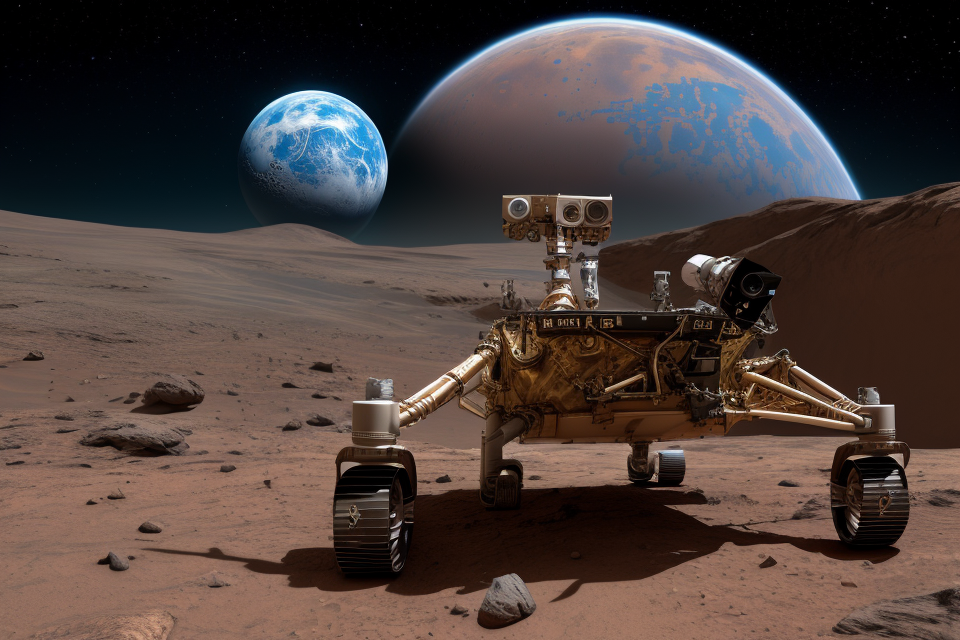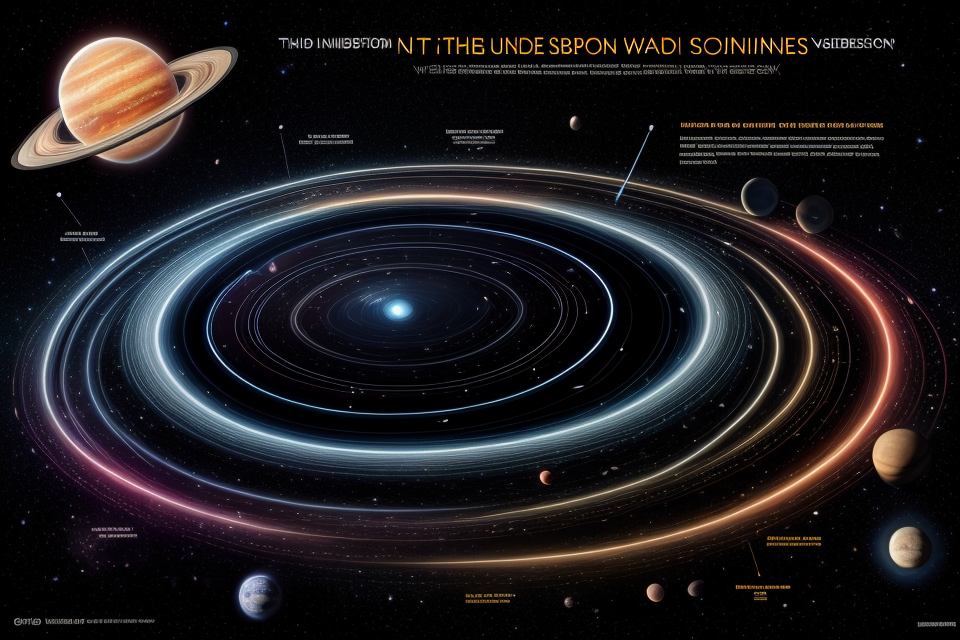Have you ever looked up at the night sky and wondered what lies beyond our planet? Space exploration has been a topic of fascination for many years, and with good reason. From advancing technology to improving our understanding of the universe, space exploration has numerous benefits that may surprise you. In this article, we’ll explore five surprising benefits of space exploration, from scientific discoveries to practical applications on Earth. So, buckle up and get ready to unlock the universe with us!
Why Space Exploration Matters
The Human Curiosity Drive
The human curiosity drive is one of the most powerful motivators for space exploration. This innate desire to understand our place in the universe and explore what lies beyond our planet has led to numerous scientific discoveries and technological advancements.
- Understanding our place in the universe: Space exploration has helped us understand our place in the universe by providing insights into the origins of the universe, the nature of space and time, and the evolution of galaxies and stars. By studying the cosmos, we have gained a deeper appreciation of the complexity and interconnectedness of the universe.
- Exploring what lies beyond our planet: Space exploration has enabled us to explore what lies beyond our planet, opening up new frontiers for scientific discovery and technological innovation. From the Moon landings to the search for exoplanets, space exploration has revealed a vast and diverse universe that is ripe for exploration and study.
By harnessing our curiosity drive, we can continue to push the boundaries of space exploration and unlock the mysteries of the universe.
Technological Advancements
Space exploration has been driving technological advancements for decades, leading to countless innovations that have improved life on Earth and opened up new possibilities for space travel and exploration. Here are some examples of how space exploration has driven technological advancements:
Improving life on Earth
- One of the most significant benefits of space exploration is the technological advancements that have come from it. For example, the materials used in space suits, such as NASA’s famous orange space suit, have been used to develop better fabrics for clothing and sports equipment.
- Additionally, the medical research conducted on astronauts has led to the development of new treatments for conditions such as bone loss and muscle atrophy, which can benefit people on Earth.
Developing new technologies for space travel and exploration
- Space exploration has also driven advancements in propulsion systems, such as the development of ion engines and solar sails, which have led to more efficient and sustainable space travel.
- Furthermore, space exploration has driven advancements in robotics and automation, which are crucial for conducting scientific research and building infrastructure in space.
In conclusion, space exploration has driven significant technological advancements that have improved life on Earth and opened up new possibilities for space travel and exploration.
Economic Impact
Space exploration has a significant economic impact that goes beyond just generating revenue. It creates jobs and drives innovation, leading to the development of new technologies and products that benefit society as a whole.
- Creating jobs and driving innovation
- The space industry is a major employer, providing jobs for engineers, scientists, and other professionals. It also attracts investment and creates spinoff technologies that have applications in other industries.
- For example, the development of satellite technology has led to the creation of GPS systems, which have revolutionized transportation and logistics.
- Generating revenue through space tourism and commercial ventures
- Space tourism is a growing industry, with companies like Virgin Galactic and Blue Origin offering suborbital flights for the wealthy.
- Commercial ventures in space include satellite imaging, telecommunications, and resource extraction from asteroids and the moon. These activities have the potential to generate significant revenue and create new markets.
Overall, the economic impact of space exploration is significant and has the potential to drive growth and innovation in a variety of industries.
The Benefits of Space Exploration
1. Inspiring a New Generation of Scientists and Engineers
Fostering an Interest in STEM Fields
- Encouraging young minds to pursue careers in science, technology, engineering, and mathematics (STEM)
- Creating a pipeline of talent for future space missions and advancements in related fields
- Offering a tangible connection between classroom learning and real-world applications
Encouraging Innovation and Creativity
- Stimulating problem-solving skills by presenting complex challenges
- Facilitating cross-disciplinary collaboration among scientists, engineers, and other experts
- Promoting a culture of exploration and discovery that can lead to breakthroughs in various fields
- Opening up new avenues for the commercialization of space technologies
- Fostering an understanding of the importance of long-term investments in research and development
Please provide more specific information on fostering an interest in STEM fields and encouraging innovation and creativity.
2. Advances in Medical Research
Space exploration has provided numerous benefits to humanity, and one of the most significant is the advancement of medical research. By studying the effects of zero gravity on the human body, scientists have gained valuable insights into the workings of our physiology. Furthermore, this research has led to the development of new medical technologies and treatments that have improved the quality of life for many people.
One of the most notable achievements of space exploration in medical research is the development of countermeasures for zero gravity-induced diseases. Astronauts in space are exposed to a microgravity environment, which can lead to a loss of bone density, muscle atrophy, and cardiovascular deconditioning. By studying these effects, scientists have been able to develop effective countermeasures, such as exercise regimes and medications, to prevent or mitigate these conditions.
Moreover, space exploration has enabled the development of new medical technologies that have practical applications on Earth. For example, the technology used to create artificial gravity on spacecraft has been adapted to develop new medical devices, such as treadmills and exercise bikes, that can help patients recover from injuries or surgeries. Similarly, the materials used in space suits have been used to develop new wound dressings and other medical products.
Furthermore, space exploration has led to a better understanding of the effects of radiation on the human body. Radiation exposure is a significant concern for astronauts during long-duration space missions, and scientists have been studying the effects of radiation on the human body to develop better protective measures. This research has also led to a better understanding of the effects of radiation on Earth, such as in cancer treatment.
In conclusion, space exploration has provided numerous benefits to medical research, including the development of countermeasures for zero gravity-induced diseases, the adaptation of space technology for medical devices, a better understanding of the effects of radiation on the human body, and the development of new medical treatments. These advancements have improved the quality of life for many people and hold great promise for the future of medicine.
3. Improved Understanding of Our Planet
Space exploration has enabled scientists to study Earth from a unique perspective, providing valuable insights into our planet’s environment, climate, and natural processes. Here are some of the ways in which space exploration has improved our understanding of our planet:
Studying Earth from space
One of the most significant benefits of space exploration is the ability to study Earth from space. By using satellites and other space-based instruments, scientists can observe the Earth’s surface, atmosphere, and oceans in detail, providing a comprehensive view of our planet’s natural processes. This has led to a better understanding of the Earth’s climate, weather patterns, and natural disasters, such as hurricanes and earthquakes.
For example, satellite imagery has been used to monitor deforestation, ocean acidification, and the melting of polar ice caps. This data has been crucial in understanding the impact of human activity on the environment and in developing strategies to mitigate these effects.
Monitoring and mitigating the effects of climate change
Space exploration has also played a crucial role in monitoring and mitigating the effects of climate change. By studying the Earth’s atmosphere and climate patterns from space, scientists can better understand the impact of human activity on the environment and develop strategies to reduce greenhouse gas emissions and mitigate the effects of climate change.
For example, satellite data has been used to monitor the concentration of greenhouse gases in the atmosphere, such as carbon dioxide and methane. This data has been crucial in developing policies to reduce emissions and in assessing the effectiveness of these policies over time.
In addition, space exploration has enabled the development of new technologies, such as solar panels and other renewable energy sources, that can be used to reduce our reliance on fossil fuels and mitigate the effects of climate change.
Overall, space exploration has provided a unique perspective on our planet, enabling us to better understand the Earth’s environment, climate, and natural processes. By studying Earth from space, we can develop strategies to mitigate the effects of climate change and protect our planet for future generations.
4. Opening Up New Opportunities for Collaboration
Building International Partnerships
One of the most significant benefits of space exploration is the opportunity to build international partnerships. By working together on space missions, countries can foster greater understanding and cooperation, which can have a positive impact on global relations. In addition, collaborating on space projects can help to build trust between nations, which can lead to more extensive cooperation in other areas.
Sharing Knowledge and Resources
Space exploration also provides an opportunity for countries to share knowledge and resources. Scientists and engineers from different countries can work together to develop new technologies and techniques for exploring space. This collaboration can lead to advancements in many fields, including materials science, computer science, and biotechnology. By sharing knowledge and resources, space exploration can help to accelerate the pace of scientific progress and improve the lives of people around the world.
Additionally, space exploration can also help to create new economic opportunities. By developing new technologies and techniques for exploring space, companies can create new products and services that can be sold to a global market. This can lead to the creation of new jobs and industries, which can have a positive impact on local economies.
In conclusion, space exploration offers many benefits, including opening up new opportunities for collaboration. By working together on space missions, countries can build international partnerships, share knowledge and resources, and create new economic opportunities. These benefits can have a positive impact on global relations, scientific progress, and local economies.
5. Expanding Our Horizons
Space exploration has the potential to broaden our perspectives in several ways. Here are some of the ways in which it can do so:
Encouraging a global perspective
One of the key benefits of space exploration is that it encourages a global perspective. This is because space exploration is a collaborative effort that involves scientists and researchers from all over the world. By working together on a common goal, these individuals are able to develop a better understanding of one another’s cultures and perspectives. This, in turn, can help to break down barriers and promote greater understanding and cooperation between nations.
Fostering a sense of unity and cooperation among nations
Another way in which space exploration can expand our horizons is by fostering a sense of unity and cooperation among nations. Space exploration is a costly endeavor that requires significant resources and expertise. As a result, it is often necessary for nations to work together in order to achieve their goals. This collaboration can help to build trust and foster greater understanding between nations, which can have a positive impact on international relations.
Additionally, space exploration can provide a common goal for nations to work towards. This shared goal can help to promote a sense of unity and cooperation, as individuals and nations work together towards a common purpose. This can be particularly important in a world that is often divided by political and cultural differences.
Overall, space exploration has the potential to expand our horizons in a number of ways. By encouraging a global perspective and fostering a sense of unity and cooperation among nations, it can help to promote greater understanding and cooperation between individuals and nations from all over the world.
FAQs
1. What are the benefits of space exploration?
There are many benefits to space exploration, including advancements in technology, increased scientific knowledge, inspiration for future generations, and the potential for resource utilization. Additionally, space exploration can help us better understand our own planet and the universe as a whole.
2. How does space exploration benefit technology?
Space exploration has led to many technological advancements, including the development of new materials, propulsion systems, and communication technologies. These advancements have a wide range of applications, from improving our daily lives to helping us tackle global challenges such as climate change.
3. What are some of the scientific discoveries made through space exploration?
Space exploration has led to a wealth of scientific discoveries, including the discovery of new planets and moons, insights into the origins of the universe, and a better understanding of the physics of space. These discoveries have expanded our knowledge of the universe and have helped us make new connections between different fields of science.
4. How does space exploration inspire future generations?
Space exploration has a unique ability to inspire and captivate people of all ages. Through space exploration, we can encourage young people to pursue careers in science, technology, engineering, and math (STEM) fields, which are critical to our future. Additionally, the idea of exploring the unknown and pushing the boundaries of human knowledge can be a powerful motivator for innovation and progress.
5. What are the potential resources that can be utilized through space exploration?
There are many resources that could potentially be utilized through space exploration, including minerals, water, and even solar energy. Additionally, space exploration could potentially lead to the development of new technologies for extracting resources from the moon and other celestial bodies. This could have a wide range of benefits for our planet, including reducing our reliance on finite resources and helping us address environmental challenges.



